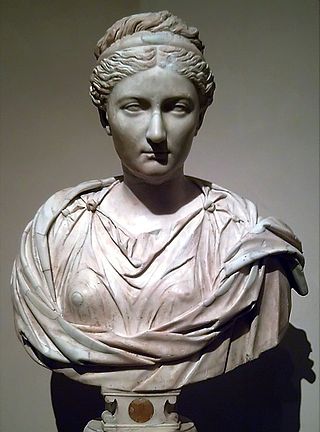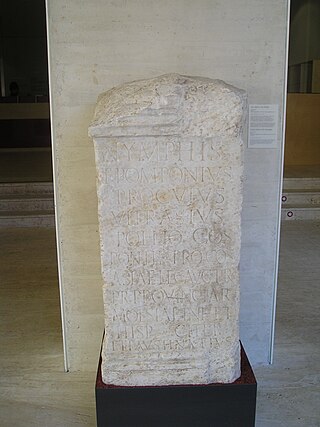Related Research Articles
Faustina may refer to:

Annia Galeria Faustina the Younger was Roman empress from 161 to her death as the wife of emperor Marcus Aurelius, her maternal cousin. Faustina was the youngest child of emperor Antoninus Pius and empress Faustina the Elder. She was held in high esteem by soldiers and her husband as Augusta and Mater Castrorum and was given divine honours after her death.
Marcus Annius Verus was the paternal grandfather and adoptive father of the Roman Emperor Marcus Aurelius, and father-in-law of emperor Antoninus Pius.

Annia Cornificia Faustina was the youngest child and only daughter of the praetor Marcus Annius Verus and Domitia Lucilla. The parents of Cornificia came from wealthy senatorial families who were of consular rank. Her brother was the future Roman emperor Marcus Aurelius, and both were born and raised in Rome.
Marcus Annius Libo was a Roman Senator active in the early second century AD.

Marcus Annius Verus Caesar was a son of Roman Emperor Marcus Aurelius and Empress Faustina the Younger. Annius was made caesar on 12 October 166 AD, alongside his brother Commodus, designating them co-heirs of the Roman Empire. Annius died on 10 September 169, at age seven, due to complications from a surgery to remove a tumor from under his ear. His death left Commodus as the sole heir.

Annia Cornificia Faustina Minor was a daughter of the Roman emperor Marcus Aurelius and his wife, Faustina the Younger. She was sister to Lucilla and Commodus. Her maternal grandparents were Antoninus Pius and Faustina the Elder, and her paternal grandparents were Domitia Lucilla and praetor Marcus Annius Verus. She was named in honor of her late paternal aunt Annia Cornificia Faustina.

The gens Annia was a plebeian family at ancient Rome. Livy mentions a Lucius Annius, praetor of the Roman colony of Setia, in 340 BC, and other Annii are mentioned at Rome during this period. Members of this gens held various positions of authority from the time of the Second Punic War, and Titus Annius Luscus attained the consulship in 153 BC. In the second century AD, the Annii gained the Empire itself; Marcus Aurelius was descended from this family.
Ceionia Fabia was a noble Roman woman and a member of the ruling Nerva–Antonine dynasty of the Roman Empire.
Marcus Peducaeus Plautius Quintillus was a Roman noble closely related by birth, adoption, and marriage to the Nerva-Antonine emperors. Through his marriage to Fadilla, the daughter of Emperor Marcus Aurelius and Empress Faustina the Younger, he became the brother-in-law to the future emperor, Commodus. Despite his position, he never became emperor himself. After Commodus was assassinated in 192, he fell out of favor with Septimus Severus during the Year of the Five Emperors. In 205, he killed himself after Septimus issued an order for his execution.

Vibia Aurelia Sabina was the youngest daughter and child born to Roman Emperor Marcus Aurelius and Roman Empress Faustina the Younger. She was a sister to Roman Empress Lucilla and Roman Emperor Commodus. Her maternal grandparents were Roman Emperor Antoninus Pius and Roman Empress Faustina the Elder and her paternal grandparents were Domitia Lucilla and praetor Marcus Annius Verus.
Vitrasia Faustina was a noble Roman woman who lived in the 2nd century during the Roman Empire.

Titus Pomponius Proculus Vitrasius Pollio was a Roman senator, who held several imperial appointments during the reign of Marcus Aurelius. He was suffect consul in an undetermined nundinium around 151; he was a consul ordinarius in the year 176 with Marcus Flavius Aper as his colleague.
Gnaeus Claudius Severus was a Roman senator and philosopher who lived in the Roman Empire during the 2nd century AD.
Marcus Ummidius Quadratus Annianus (138–182) was a Roman Senator and the nephew of the Emperor Marcus Aurelius. He was involved in an unsuccessful plot to assassinate his cousin the Emperor Commodus, which led to his execution afterwards.
Tiberius Claudius Severus Proculus was a Roman Senator. Via his mother he was a grandson of Emperor Marcus Aurelius, but he played only a limited role in dynastic politics.
Annia Faustina was a noblewoman of Anatolian Roman descent and a wealthy heiress who lived in the Roman Empire. She was a mother-in-law of the emperor Elagabalus.
Lucius Fundanius Lamia Aelianus was a Roman senator active in the reigns of Trajan and Hadrian.

The gens Fundania was a plebeian family at Ancient Rome, which first appears in history in the second half of the third century BC. Although members of this gens occur well into imperial times, and Gaius Fundanius Fundulus obtained the consulship in BC 243, the Fundanii were never amongst the more important families of the Roman state.
Marcus Annius Libo was a Roman senator. He was suffect consul in the nundinium of January-April 161 with Quintus Camurius Numisius Junior as his colleague. Libo was the nephew of emperor Antoninus Pius, and cousin to emperor Marcus Aurelius.
References
- ↑ Monumenta Graeca et Romana: Mutilation and transformation : damnatio memoriae and Roman imperial portraiture. BRILL. 2004-01-01. ISBN 978-90-04-13577-2.
- 1 2 Peachin, Michael (2011-01-04). The Oxford Handbook of Social Relations in the Roman World. Oxford University Press. ISBN 978-0-19-939741-9.
- 1 2 Levick, Barbara M. (2014-02-01). Faustina I and II: Imperial Women of the Golden Age. Oxford University Press. ISBN 978-0-19-970217-6.
- ↑ Setälä, Päivi (2002). Women, Wealth and Power in the Roman Empire. Institutum Romanum Finlandiae. ISBN 978-952-5323-02-3.
- 1 2 Birley, Anthony R. (2012-12-06). Marcus Aurelius: A Biography. Routledge. ISBN 978-1-134-69569-0.
- ↑ Birley, Anthony R. (2002-06-01). Septimius Severus: The African Emperor. Routledge. ISBN 978-1-134-70746-1.